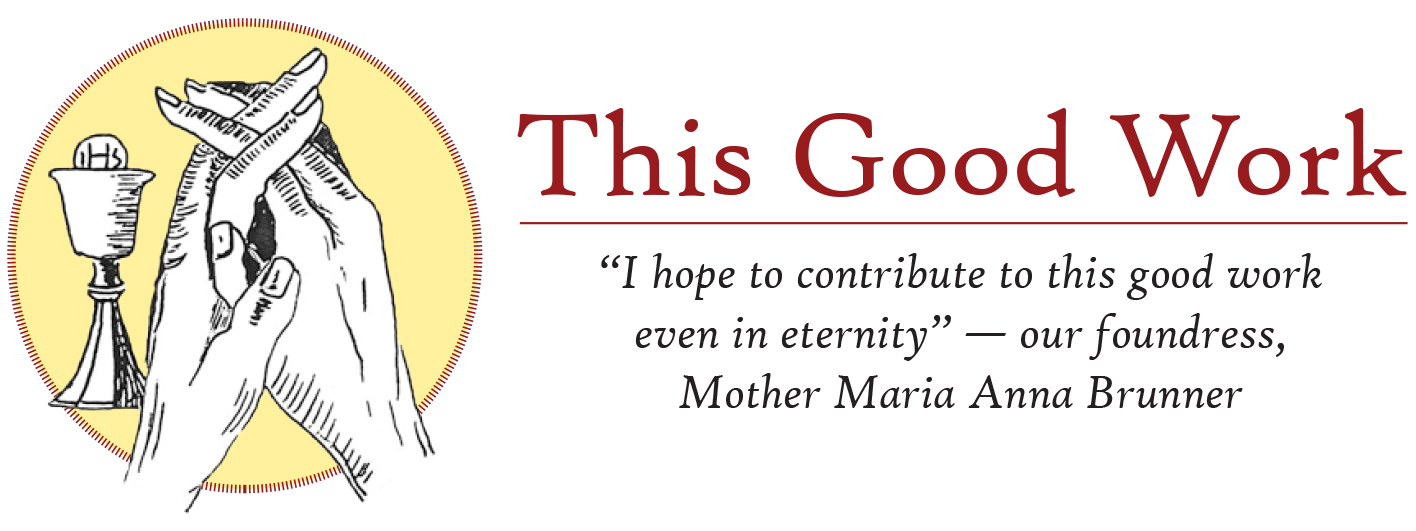
“This Good Work” is the Congregation’s bi-monthly e-newsletter to give witness to Precious Blood Spirituality through the lens of social justice, rooted in Gospel values and Catholic social teaching. In it we share real, legitimate information and ways Sisters are thinking and living out many issues of peace, justice and ecology. This is curated by Jen Morin-Williamson, the Peace, Justice and Ecology Coordinator and features articles by Sisters.
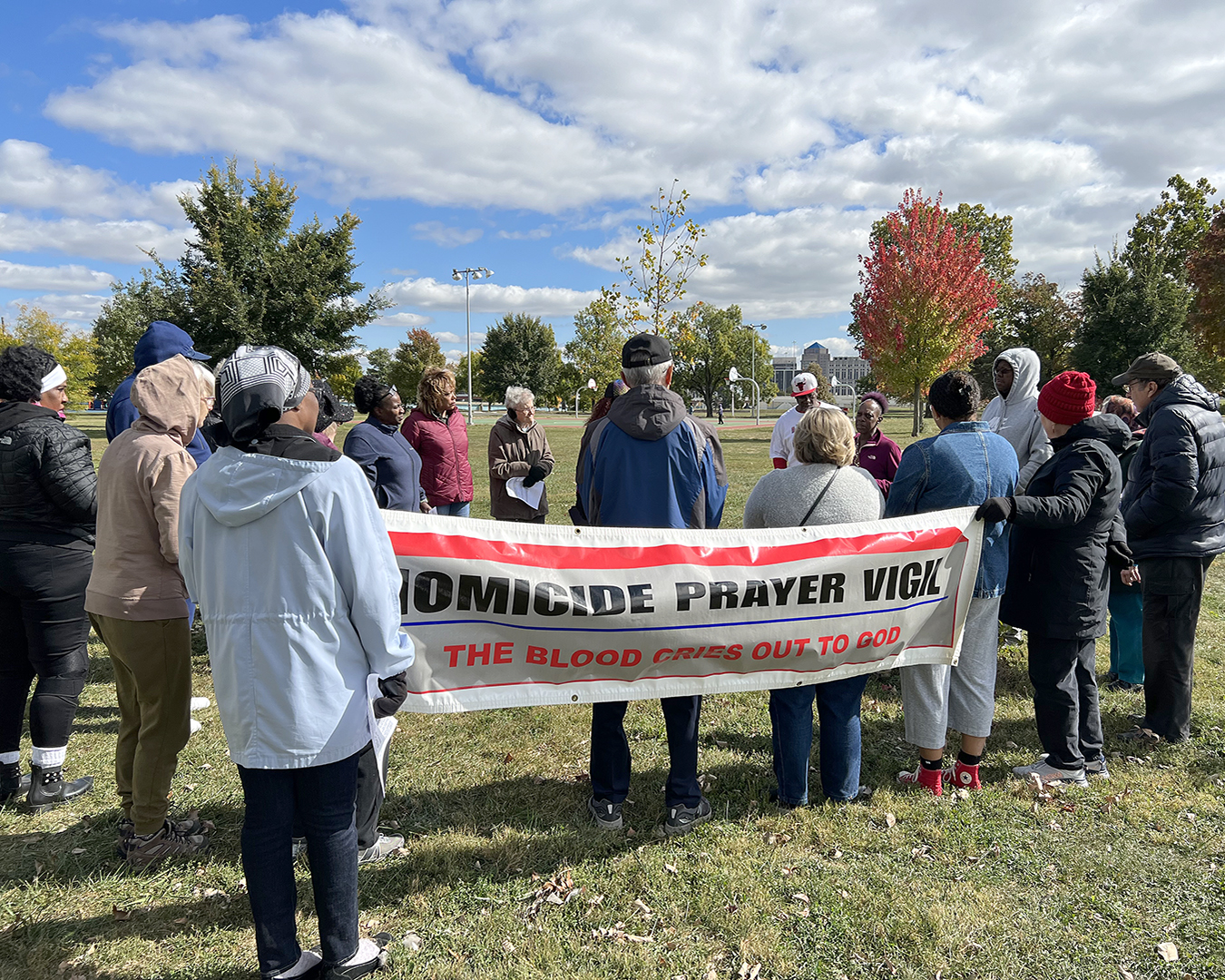 Signs of the Precious Blood All Around Us
Signs of the Precious Blood All Around Us
By Sister Rita Rogier, CPPS
One recent morning, my day started by attending part of the run/walk for the Brunner Literacy Center, which was co-founded by two Precious Blood Sisters, and where our Sisters still give of their time and talent. I was there to show support for CPPS Sisters, staff and friends of the Center.
Later, I attended the first in-person homicide vigil since COVID shut down the monthly vigils. The vigil was for a young man, George Davis, 31, who was murdered September 3. This shooting took place on Salem Avenue, close to our central house in Dayton. George’s mother was present, along with several relatives. His mother shared quite a bit about what she knew about the murder, but her main message was telling about the many positive qualities of her son and the sharing of her grief and pain with us. We thanked her and gave our love, support and promise of prayers. An inspirational prayer service followed. We went away knowing that God had been present in a special way and realizing that the blood cries out for peace and reconciliation. Read More
As I was leaving, I walked by a car with several people standing by it. One young man wanted to let me know that he heard some of what we were saying during the vigil. I could see that it was important for him to tell me the name of a young relative murdered in Dayton several years ago. I think he was comforted by my listening to him and offering support and prayers. That was an added and unexpected benefit of the vigil.
I walked on to our car and passed the House of Bread, co-founded by Sister Dorothy Kammerer, CPPS. Our car was in the parking lot of Catholic Social Services, which also has past and current connections to our Congregation. It was definitely a CPPS kind of day!
In slider above and at right, Homicide vigil in Dayton, Ohio, on October 8, 2022; Michelle Bodine photos.
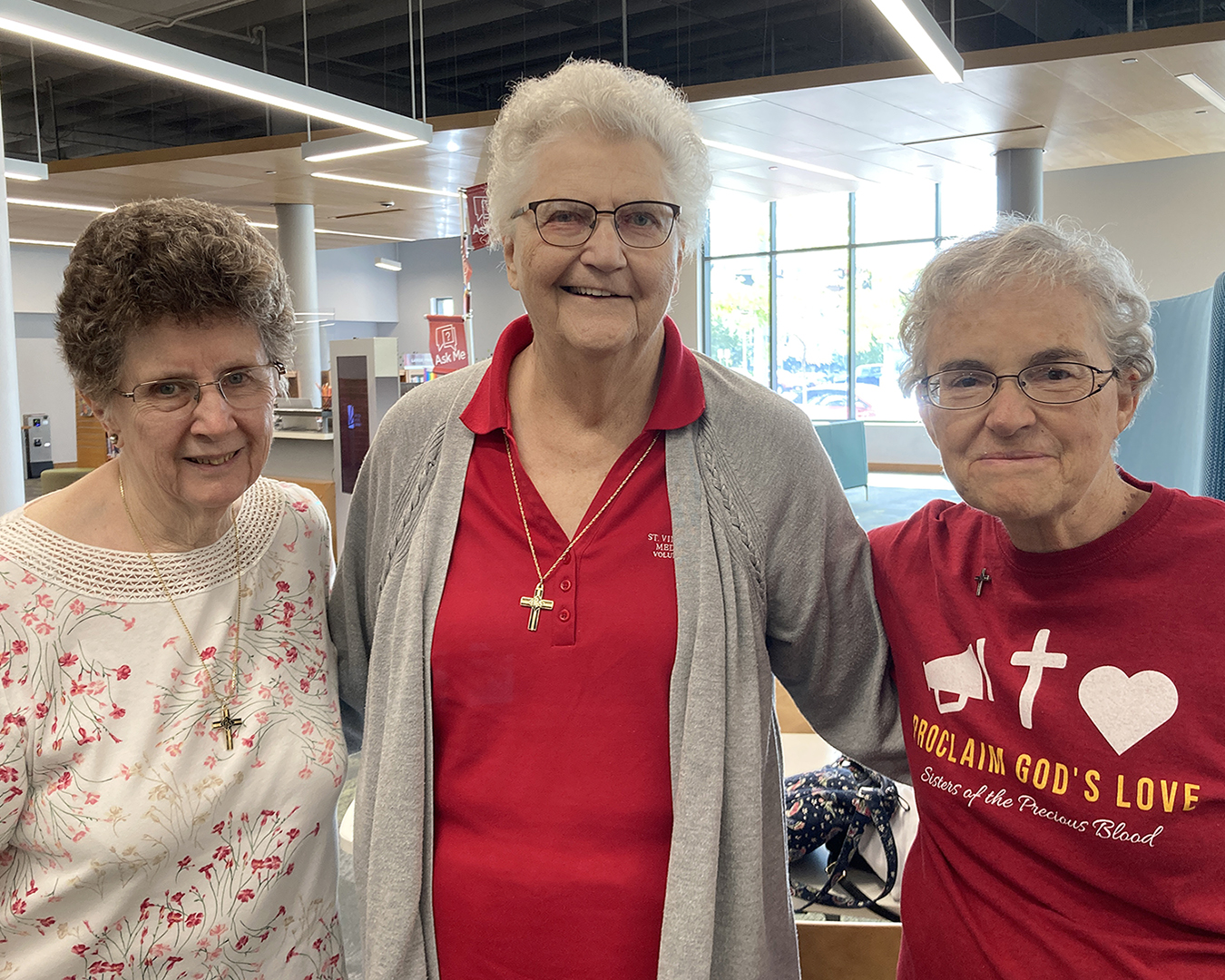 One step more in eliminating human trafficking in the Dayton area
One step more in eliminating human trafficking in the Dayton area
By Sister Marita Beumer, CPPS
Just recently the Dayton chapter of the SOAP (Save Our Adolescents from Prostitution) Project was restarted by a group of interested volunteers. The SOAP Project is a volunteer organization founded by Theresa Flores, an advocate and survivor of human trafficking.
For the past several years, Theresa has enabled us in the Dayton area to participate in activities that raise awareness of human trafficking and advocate for victims. As activities are normalizing after the slowdown of the COVID pandemic, we will be able to train volunteers and plan and implement different SOAP activities. The peace, justice and ecology coordinator for the Sisters of the Precious Blood, Jen Morin-Williamson, is one of the volunteers re-initiating the Dayton chapter. Read More
One of the core activities that the SOAP Project has been undertaking is to visit motels informing the employees how to detect when human trafficking is occurring. We also give them small bars of soap and makeup remover that are labeled with the national anti-human trafficking hotline number. Over the years, Precious Blood Sisters have assisted SOAP with labeling thousands of bars of soap.
SOAP’s Dayton chapter is planning to have a concerted effort to visit motels on March 4, before the 2023 NCAA Tournament First Four basketball games. Several weeks ago, some volunteers took a Human Trafficking 101 class to prepare. Jen and some Sisters also gathered with other volunteers for a short session and visited a few motels.
For me, the most satisfying part of this process is a return visit to the motels. Many times, we hear success stories about women who used the phone number on the bar of soap to call the hotline and escape trafficking. Also, it is gratifying to hear how the employees and managers have become much more aware of the problem and gratefully receive our material. Since we did not visit motels during the COVID outbreak, there are boxes of labeled soap ready to be distributed that were prepared by the Sisters and other volunteers years ago.
The Dayton SOAP chapter is affiliated with Abolition Ohio, founded in 2010 through the Human Rights Center at the University of Dayton. Abolition Ohio has about 30 members and takes a holistic approach to prevent human trafficking. The SOAP Project is just one of the many aspects by which they are doing this. The Sisters of the Precious Blood have been associated with Abolition Ohio since the beginning, trying to fulfill our mission to “be a life-giving, reconciling presence” to victims as well as to the volunteers.
Recently about 20 Sisters became prayer partners with women who are trying to escape trafficking and begin recovery. This is coordinated through the organization Dear Dinah, another affiliate with Abolition Ohio that is engaged with the women who wish to recover from trafficking. It is heartening to know that through the collaboration between these affiliates and law enforcement, human trafficking has decreased considerably in the Dayton area.
In slider above, Peg Birkemeyer, along with Sisters Mary Ann Mozser, Arlene Hirsch and Rita Rogier, apply labels to the bars of soap and makeup remover; at right, Sisters Arlene, Mary Ann and Rita; Jen Morin-Williamson photos.
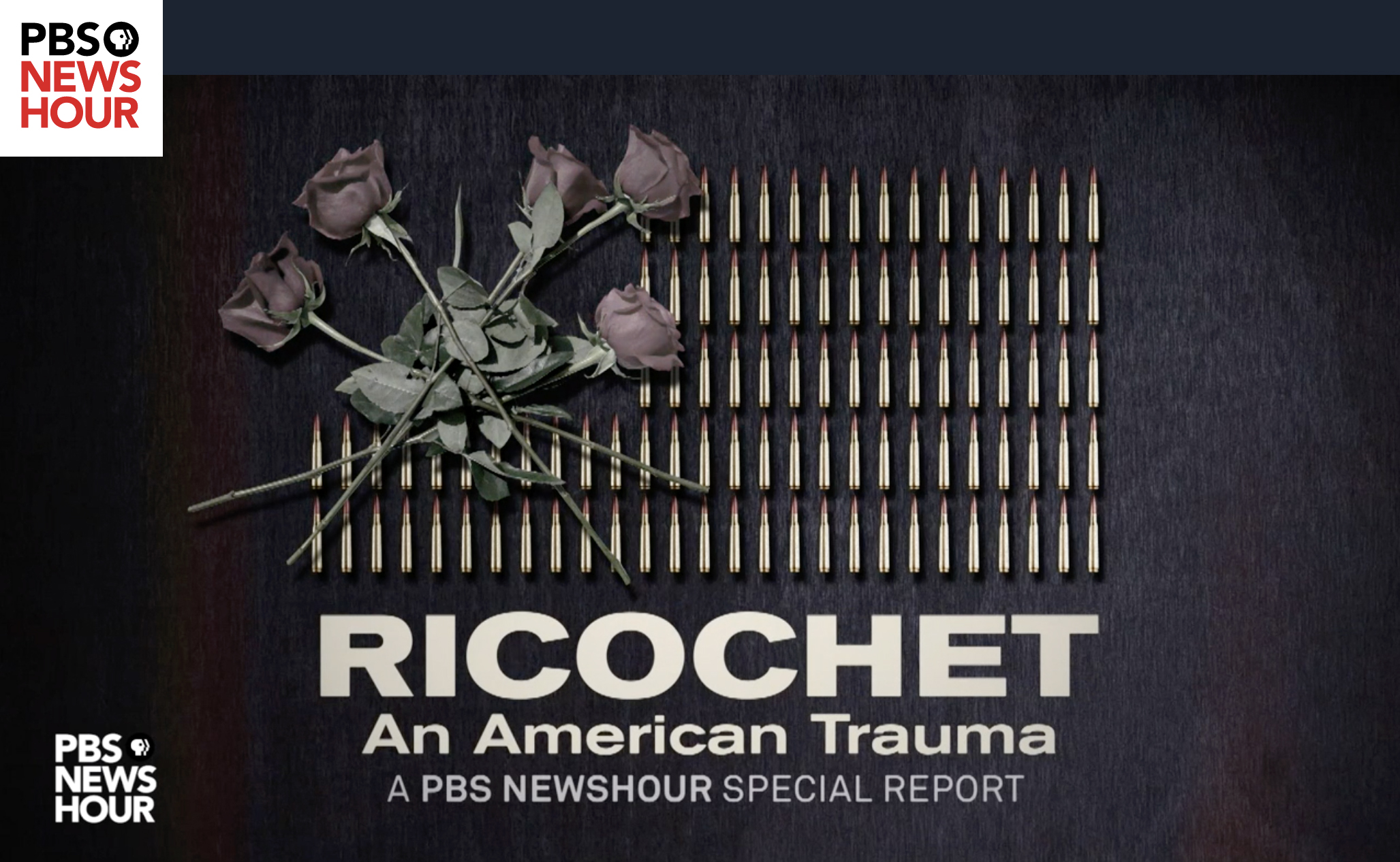 Ricochet: An American Trauma
Ricochet: An American Trauma
By Sister Mary Lou Schmersal, CPPS
What gun experiences have impacted you? We have become so numb to everyday gun violence on TV and in our neighborhoods, newspapers and families that we stop hearing, noticing or caring that so many hundreds of people are impacted each day … until it touches us personally! Ongoing daily events not only impact individuals but entire communities with a lifetime of pain, regret, stress, anxiety and worry — numbing us to the point of hopelessness. It is now a collective trauma for all of us; we can no longer claim it is someone else’s problem. Read More
PBS has produced a recent riveting documentary capturing the stories of this slow-moving trauma of gun violence and the reality of how it changes each of us in fundamental ways.
Watch Ricochet: An American Trauma, a PBS NewsHour special report, online for free.
 Climate change affects all of us
Climate change affects all of us
By Sister Martha Bertke, CPPS
The Inflation Reduction Act is one of the most significant pieces of legislation in years, and it has major implications for America’s environmental policy. Does this new law affect our nation, our world and, in particular, we the Sisters of the Precious Blood? YES!
This law aims to curb inflation by reducing the deficit, lowering prescription drug prices and investing in domestic energy production while promoting clean energy. On August 16, 2022, it was passed by the 117th United States Congress and signed into law by President Joe Biden. It is a budget reconciliation bill sponsored by Senators Chuck Schumer and Joe Manchin.
The law, as passed, will raise $738 billion and authorize $391 billion in spending on energy and climate change. It represents the largest investment into addressing climate change in United States history. A summary identifies primary goals as driving down consumer energy costs, increasing energy security, and reducing greenhouse gas emissions. The bill also aims to decrease residential energy costs by focusing on improvements to home energy efficiency. Some of this money will be used for renewable energy investment, including wind and solar projects. According to several independent analyses, the law is projected to reduce greenhouse gas emissions to 40% by 2030. Read More
Laudato si’ (On Care for our Common Home), the second encyclical of Pope Francis, was published in 2015. In it, the pope laments environmental degradation and global warming and calls all people of the world to take unified global action. It presents a challenge for all of us to consider in a radical way how our future on this planet will be determined by the manner in which we treat all of creation.
In response to this call from our pope, we Sisters of the Precious Blood have taken some action for the good of our environment. During our Assembly of 2019, we created several directive statements, which animate us to live Gospel values in our present world. One statement is “We continue and expand our efforts regarding care of our endangered earth.”
Our Congregation’s Justice Committee, of which I am a member, raises awareness and strives to challenge people to think, judge and act for the common good of society. We are grateful to our U.S. Congress for creating laws to care for our earth and to our pope for challenging all of us humans to care for our earth. However, it is we, the people, who must act.
What will you do for our environment? How will you address climate change? What will you do to care for our earth?
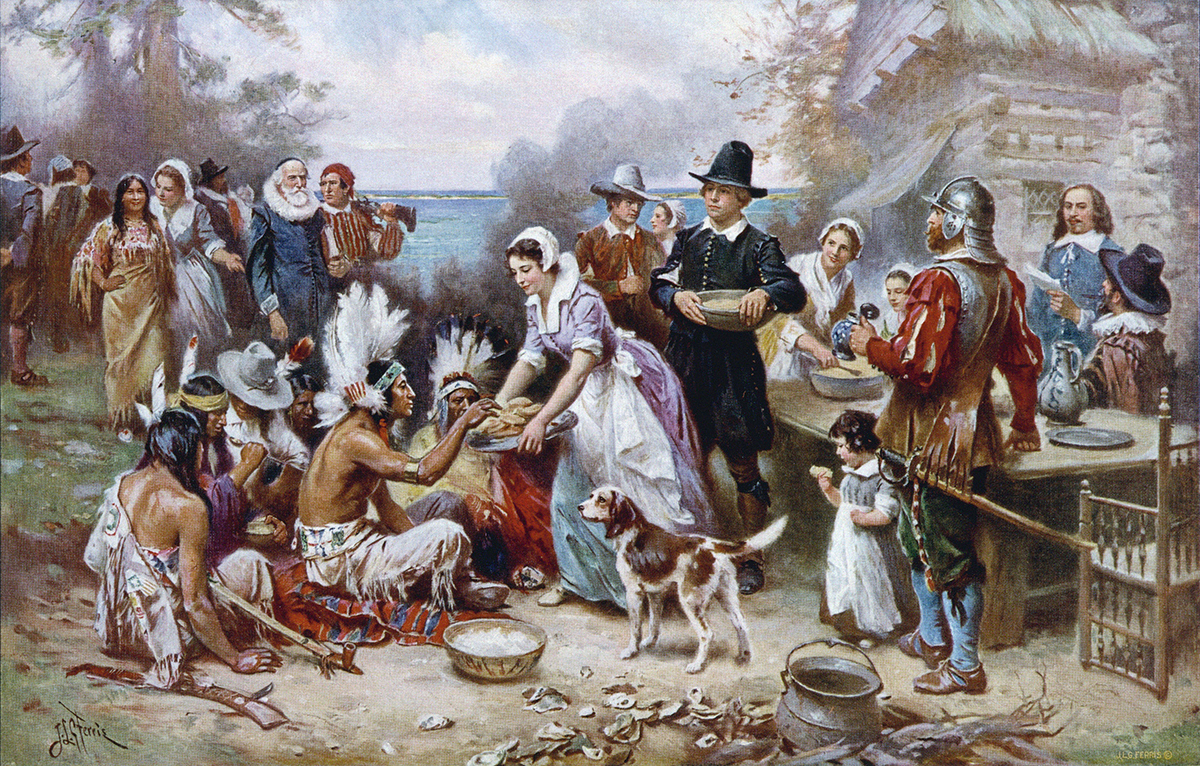 Thoughts on Thanksgiving
Thoughts on Thanksgiving
By Jen Morin-Williamson, Peace, Justice and Ecology Coordinator
As November unfolds, my thoughts turn toward a festive table set with turkey, pumpkin pie and mountains of other delectable dishes. And of course, this celebration would not be complete without our loved ones, our family and friends. However, as I pull out my Thanksgiving decorations, handed down from my mother, I pause. I recall the story I was taught about this holiday: The Pilgrims came to America and were welcomed with open arms by the “Indians” who generously helped them learn how to farm in this country. With that first successful harvest, the Pilgrims threw a big party and invited the “Indians.” The end.
But is that the end? What really happened next? Read More
Decades of public and Catholic education did not impact the story I was taught and continued to tell myself, which I passed on to my children. Then in graduate school, I started learning about racism and the history that I’d never learned. I realized that I had missed a lot. I began being very intentional about broadening my perspective and educating myself through reliable, scholarly sources. I began being very attentive to how I referred to people, taking into account their preferences. And I discovered that what I had learned all those years ago may not be respectful — or accurate.
I can be intentional in changing my mindset and educating myself about history and culture. One good first step has been to understand that each tribe prefers to be addressed by its tribal nation name, such as the Delaware Tribe of Indians; the Miami Tribe of Oklahoma; or the Great Lakota, Dakota, Nakota Nation. If I don’t know the specific nation name, I can use “American Indian” or “Native American” — never simply “Indian,” which refers to the peoples and cultures of the South Asian nation of India. And even these general terms are inadequate for some and evolving. Or, if I am speaking with a Native person, I may ask them their preference.
If you are interested in learning more, take some time to read “American Indian Perspectives on Thanksgiving” from the National Museum of the American Indian, part of the Smithsonian Institution. Here is the link.
Thank you to Patricia Dixon — a former member of the Congregation who is also a member of the Pauma Band of Luiseño Indians and professor emerita of American Indian Studies, History, and American Studies at Palomar College — for providing cultural and historical insight. Thank you also to Sister Mary Yarger, CPPS, for connecting us with Ms. Dixon.
In slider above and at right, The First Thanksgiving painted by Jean Leon Gerome Ferris.
 Prayer
Prayer
Great Spirit,
Your Brilliance and Creativity are reflected in Your creation.
We are grateful.
As many in our country gather for Thanksgiving,
may we pause and consider the stories we have been told.
May we have courage to confront the half truths.
May we seek to understand another perspective.
May we work towards healing for the great pain inflicted
on all of the tribal nations.
May we be personally and culturally transformed
into a truthful future that is honest about our past.
We ask this through the redeeming love of Your Son, Jesus.
Amen
Sign up for our e-newsletters!

 Signs of the Precious Blood All Around Us
Signs of the Precious Blood All Around Us One step more in eliminating human trafficking in the Dayton area
One step more in eliminating human trafficking in the Dayton area Ricochet: An American Trauma
Ricochet: An American Trauma Climate change affects all of us
Climate change affects all of us Thoughts on Thanksgiving
Thoughts on Thanksgiving Prayer
Prayer









